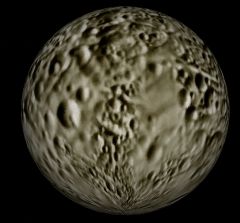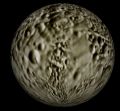Difference between revisions of "Paaliaq"
Jump to navigation
Jump to search
(Added content.) |
(Added category.) |
||
| Line 75: | Line 75: | ||
[[Category:Celestial bodies]] | [[Category:Celestial bodies]] | ||
[[Category:Natural satellites]] | [[Category:Natural satellites]] | ||
| + | [[Category:Satellites of Saturn]] | ||
{{Nsat-Stub}} | {{Nsat-Stub}} | ||
Revision as of 03:22, 8 August 2024
| Paaliaq | |
|---|---|

| |
| Paaliaq from osaturn.zip in Orbiter 2002 | |
| Designation | |
| Name | Paaliaq |
| Reference body | Saturn |
| Planetary mean orbits | |
| Epoch | 1999 |
| Semimajor axis (a) | 15199100000 m |
| Eccentricity (e) | 0.3637 |
| Inclination (i) | 45.1267289° (0.78761 radian) |
| Longitude of the ascending node (LAN, ☊) | 327.1823923° (5.71041 radian) |
| Longitude of periapsis (ϖ) | 134.4502762° (2.3466 radian) |
| Mean longitude (L) | 145.9432366° (2.54719 radian) |
| Selected physical parameters | |
| Mean radius | 1700 m |
| Mass | 1.9×1012 kg |
| Rotation elements | |
| SidRotPeriod | 95349888 seconds (3.02 years) |
| SidRotOffset | 0.17 |
| Obliqutiy | 0.4895 |
| LAN | 6.09808 |
| Note | *Elements given are from S2000_S2.cfg (osaturn.zip) |
Paaliaq (S/2000 S 2) is one of the irregular outer moons of Saturn, discovered in October 2000, and named after a character in the book The Curse of the Shaman. Paaliaq orbits Saturn prograde at about 15 million km, an eccentricity of about 0.384, inclined about 47°.
Paaliaq in Orbiter
Paaliaq was introduced as S2000_S2 in the add-on osaturn.zip in October 2002.
| Add-on | Source | Version | Author | Type | Release Date | Compatibility | Wiki article |
|---|---|---|---|---|---|---|---|
| Moons of Saturn Part 3 | AVSIM | Rolf Keibel | Scenery | 19 October 2002 | |||
See also
Gallery
| edit The Solar System | |
|---|---|
| Central star |
Sun (Sol) |
| Planets |
Mercury - Venus - Earth - Mars - Jupiter - Saturn - Uranus - Neptune |
| Natural satellites |
Moon - Phobos - Deimos - Io - Europa - Ganymede - Titan - more... |
| Add-ons |
Planets - Dwarf Planets - Small objects - Natural satellites - Alternative star systems |
 | This natural satellite related article is a stub. You can help Orbiterwiki by expanding it.
|

